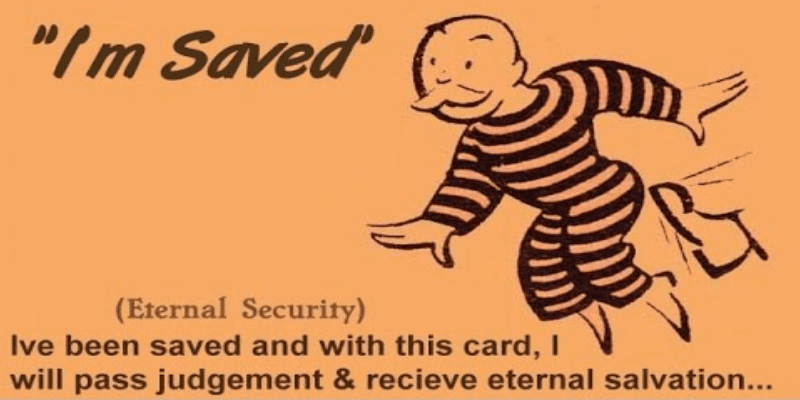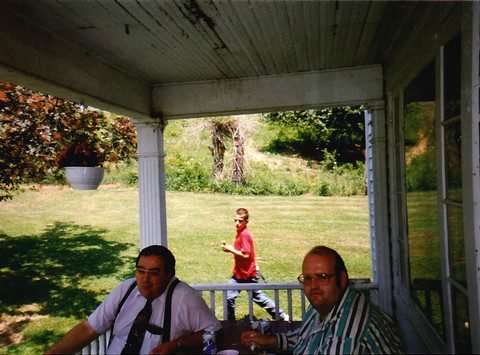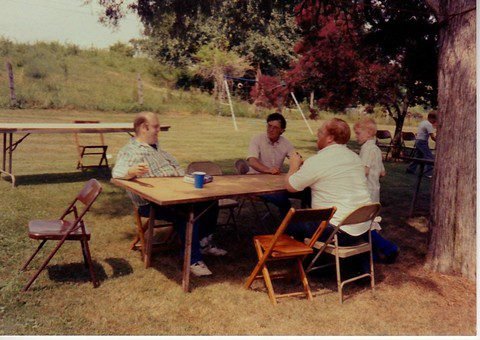
Several years ago, on a cold, wet Ohio winter day, a door-to-door hustler for Erie Construction knocked on our door, asking if we would be interested in receiving a vinyl siding estimate. I said, “sure.” I knew we either had to side or repaint our home, so I thought, here’s my opportunity to get our first estimate.
On the appointed day, two Erie Construction salesmen showed up at 1:20 p.m. for our 1:00 p.m. estimate. STRIKE ONE. Don’t be late. I have plenty of things to do on any given day, and if I set time aside to hear your sales pitch, BE ON TIME! Neither salesman apologized for being late. I gave them a pass, though it is not uncommon for me to tell tardy salesmen, “sorry, you missed your window of opportunity. Maybe later.” Of course, this usually pisses them off. And I care how much? Not at all. BE ON TIME!
Having spent most of my adult life selling Jesus, I am quite familiar with the techniques used by salesmen to get me to sign on the dotted line. The only difference between selling religion and siding/vacuüm cleaners/automobiles is the product. The goal is the same. Get the customer to buy your product, be it Jesus with an eternal warranty or Erie Construction premium siding with an original owner lifetime warranty.
The salesmen entered our home and sat down at our dining room table. One man carried the props, and the other, the alpha closer, carried a portfolio of “magic” papers with which he would later attempt to WOW us. The alpha closer did ninety-nine percent of the talking. He asked us questions about our backgrounds, family, and employment. It was Sales 101. Get to know the prospective mark. Attempt to befriend them. Use the information given to you to develop a bond. I used this very technique hundreds and hundreds of times as I traveled the highways and hedges of the communities in which I pastored, seeking to sell salvation to people I considered “lost.”
One humorous moment occurred when the salesman asked us what we did for a living. After Polly recited her résumé, the salesman turned to me and asked what I did for a living. I gave my typical answer: “I am retired and I own a photography business.” Ninety-nine times out of a hundred, this answer satisfies salesmen and busybodies alike. Not this time. The salesman asked, “Bruce, what did you do before you retired?” Remember, the word “retired” in my vocabulary means “I left the ministry and Christianity.” The word covers up shit I don’t want to talk about to strangers. I paused for a moment, thinking how best to answer the man’s question. I was already irritated by their tardiness, so I thought, how about a bit of snark? I said, “I was a pastor for twenty-five years. I pastored churches in Ohio, Texas, and Michigan.” I then continued, saying, “don’t read anything into that. God and I had a falling out and we are not on speaking terms.”
When salesmen find out I was a pastor, it is common for them to change their behavior. Anything to make a sale, right? As I often do, I made sure I used several swear words during our discussion. This was me saying, “I ain’t one of THOSE preachers, God dammit!” Fortunately, no further questions were asked. Both salesmen asked if they could measure the outside of our home. I said, “sure.” Off they went, returning ten or so minutes later, measurements in hand, ready to present to us the best siding deal on planet earth.
The alpha salesman continued his pitch by telling us the benefits of doing business with a AAA company such as Erie Construction. Evidently, he never thought an old curmudgeon such as I would bother to fact-check his claims. After they were gone, I consulted GOD — the Internet — and found out that Erie Construction was NOT a AAA company. I am sure they have thousands of satisfied customers, but they also have customers who were not satisfied with their work due to missed job start/finish dates, shoddy workmanship, and poor warranty work.
As a seller of Jesus, I too shared with prospects the wonders of the Son of God. Evangelicalism was, in my mind at the time, a AAA company, offering the forgiveness of sin, eternal life after death, and peace, purpose, and direction in this life. Who wouldn’t want to buy what I was selling, right? Most of my evangelizing took place pre-Internet. I didn’t have to worry about negative reviews of Jesus, Evangelicalism, me personally, or the church I was pastoring at the time. I relied on people taking my word for it. Today? Thanks to the world wide web, Evangelicalism has been exposed for what it is: a psychologically harmful con job; a system of belief that robs people of their humanity and their money.
The alpha salesman breathlessly shared with us the wonders of Erie Construction’s premium grade one-hundred percent vinyl siding. He spent significant time dissing his competition and their inferior siding, even though he later admitted Erie sells “inferior” siding too. “Buy cheap siding and it only lasts five to eight years,” he told us. The salesman also discounted the value of repainting our home. Polly and I, along with our younger children, painted it ourselves over two summers — 2007, 2008. I told the salesman that we were thinking about hiring someone to paint our home. Eleven years had passed since we painted our home. The intervening years had been unkind to us physically, so Polly and I painting our home was out of the question.
The salesman sensed that we were weighing “siding versus paint,” so he quickly pulled out his “magic” papers and showed us why painting our home was not cost-effective. His statistics were grossly inflated for the area we lived in. I told him, “look, I am not in good health, so I am not going be around twenty years from now.” The salesman quickly rebuffed my mortality claim, saying, “oh you’ll be around for a long time!” STRIKE TWO. I replied, “no, really, I am on the short side of life.” The salesman wouldn’t hear of it, telling me that I had a long life ahead of me. At this point, I almost said, “Look dude. You need to listen to me. I am not long for this life. If I make it to seventy, I’ll be happy.” I said nothing, deciding that I wanted to get their price for siding our home.
As a salesman for Jesus, I reminded prospects that my Jesus was the one true God, and that the salvation I was selling was the only one to promise true forgiveness of sin and eternal life after death. My “siding” was superior to that which other sects and churches were selling. I often told people, “has anyone else ever cared about you enough to knock on your door and share the Good News® with you?” Of course, I knew it was unlikely anyone but the Mormons or the Jehovah’s Witnesses had ever tried to evangelize them. Those sects were cults. I was representing the white American Jesus and Christianity. No one had a product like mine.
Finally, it came to time for the salesman to close the deal. He started using heavy-handed sales techniques, hoping that he could entice us into biting. His price? $25,000! Keep in mind, we already have new windows, doors, soffits, and gutters, so his estimate was just for the siding. His estimate, astoundingly, did not cover our small outbuilding. He asked us what we thought of the price, and I replied, “that’s a good bit more than we expected. I had thought the estimate would come in closer to $12,000-$15,000.” “Quality costs,” the salesman told us. He proceeded to use the fact that we drive a new car as a reason why we should have Erie side our home. “It’s evident you value quality in an automobile. Surely, you want the same for your home!” I thought, “yeah and your siding almost costs as much as our car!” (This summer we finally had our house painted. Cost? seventy-five percent less than Erie’s siding estimate.)
The alpha salesman attempted numerous times to get us to sign on the dotted line. Each time, I told him, we are not prepared to make a decision today. Evidently, he was hard of hearing, because no matter how often I said, “not today,” he came back at us with a slightly different angle, hoping we would say “yes.” Somewhere in this process, I said to myself, “STRIKE THREE!” I wasn’t going to do business with Erie regardless of their price. The salesman even tried to appeal to my vanity, saying I could take photos before and after and Erie would pay me to use them on their website. “What,” I thought, “$500?” I said nothing, and the salesman finally intuited that we weren’t going to buy siding from him. His demeanor was that of the air being let out of a balloon. And with that, he and his sidekick packed up their props and exited stage right.
As a seller of the Evangelical Gospel, I pressured people into praying the sinner’s prayer. I warned them of the dangers of delay. “No one knows what might happen tomorrow,” I said. “Do you really want to risk God’s judgment and eternity in Hell?” I would remind them that this might be the only time they had an opportunity to buy God’s miraculous covers-everything siding, uh I mean salvation. Whether from the pulpit or at their front door, I reminded sinners of the urgency of covering up their sinfulness with Jesus’ premium salvation, complete with an eternal warranty. Most people said, “no thanks,” but over the course of twenty-five years, hundreds and hundreds of people said, “yes!” Some of them found great value in what I was selling. Most converts, however, found out that the “siding” I was selling was not as good as I said it was. The storms of life came their way and often ripped their “siding” away, exposing the fact that Jesus was NOT the “friend who never will leave you” as I promised he was. What they found, instead, was a religion that demanded their fealty and money. Most of them, eventually, said, as we did to Erie Construction, “no, thanks!”
Bruce Gerencser, 66, lives in rural Northwest Ohio with his wife of 45 years. He and his wife have six grown children and thirteen grandchildren. Bruce pastored Evangelical churches for twenty-five years in Ohio, Texas, and Michigan. Bruce left the ministry in 2005, and in 2008 he left Christianity. Bruce is now a humanist and an atheist.
Connect with me on social media:
Your comments are welcome and appreciated. All first-time comments are moderated. Please read the commenting rules before commenting.
You can email Bruce via the Contact Form.











